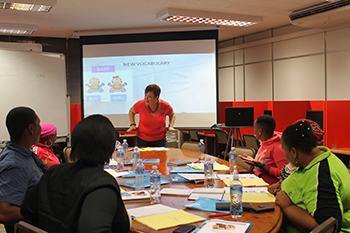Latest News Archive
Please select Category, Year, and then Month to display items
10 March 2022
|
Story Anthony Mthembu
|
Photo Unsplash
 The No Student Hungry team gearing up to start distributing food parcels to the selected students.
The No Student Hungry team gearing up to start distributing food parcels to the selected students.
The UFS is one of the many institutions of higher learning where food insecurity is an active issue. However, the
No Student Hungry Programme is one of the initiatives launched at the university to assist in fighting food insecurity at the institution.
The purpose of the programme
Since its inception in 2011, the initiative has assisted many students in acquiring a healthy meal. Additionally, the Food Environment Office also hands out food packages, so that students can continue to achieve academically. “We are trying to develop a healthy environment for students and make it easier for them to have a nice and healthy meal,” stated Annelize Visagie, who heads the Food Environment Office at the UFS. The Food Environment programme is spread out on all three campuses, each with its own facilitators. Furthermore, the programme mainly caters for students who are not funded by the National Student Financial Aid Scheme (NSFAS) but who are excelling academically. The abovementioned students apply for assistance online, and a list is then drawn up of students who receive assistance for the year.
Alternative solutions to keep the initiative running
On the Bloemfontein Campus, the No Student Hungry Programme will be catering for 200 students in the 2022 academic year, assisting them with a daily nutritious meal. Additional food parcels are also handed out to provide further assistance. “We give food parcels to the students on the list every Tuesday and Thursday at the Thakaneng Bridge,” Visagie highlighted. However, she argues that catering for the student population through this programme can be a challenge, as the demand for assistance is growing rapidly and the ability to assist is limited. The programme relies on partnerships and sponsors to assist the student body. In fact, the coordinators of the programme currently have a memorandum of understanding with Tiger Brands according to which they deliver around 100 food parcels for distribution.
In addition, the coordinators have put in place alternative measures to ensure that they can provide more food to students. “The
Kovsie Act Office, in partnership with the
Department of Sustainable Food Systems and Development, has started a food garden where healthy and nutritious produce are grown, in order to add value to the distribution,” she indicated. Although the programme can only assist to a point, students who are in desperate need of assistance are never turned away. In fact, the
Social Support Unit at Thakaneng Bridge usually assists students with food vouchers for a maximum of four days.
A commitment to teaching healthy eating habits
The programme is not only committed to curbing food insecurity, but also to ensuring that students have a healthy and balanced diet. As such, a booklet is being issued by the
Department of Nutrition and Dietetics in collaboration with the Department of Sustainable Food Systems and Development, which contains ways in which students can make a healthy meal using some of the ingredients offered in the food parcels.
“We want to teach students how to eat healthy in the cheapest way, because they don’t have a lot of money to buy expensive food products,” Visagie argued.
UFS provides sign language skills to locals
2016-02-12

Susan Lombaard teaching at one of the sessions
Photo: Valentino Ndaba |
The public and private sectors are becoming more aware of the need for effective communication between employers, employees, and clients who use Sign Language. Given that Sign Language is the first language of approximately 600 000 people in South Africa, competence in the language means taking the first step towards more inclusive service delivery.
Shout Out Loud - a project that promotes Sign Language - has signed up Bloemfontein Celtics, Centlec, Beyond Boundaries, and the Mangaung Municipality on a Basic South African Sign Language course at the University of the Free State.
No miscommunication
Susan Lombaard, the Acting Head at the Department of South African Sign Language, was one of the lecturers who presented the 40-hour accredited course every Friday from 15 January-12 February 2016. Other lecturers who were responsible for training were Emily Matabane and Tshisikhawe Dzhivani.
Lombaard believes that learning Sign Language bridges the gap between the hearing and those who have impairments. “The benefit is that there will be no miscommunication. It happens that a deaf person walks into a bank or municipality offices and there is no communication. They need to write which is humiliating for that person.”
Towards a promising future
According to Goodwill Mokoena, Project Manager at Beyond Boundaries, the project will continue annually, and a larger intake of government departments and non-governmental organisations is expected in 2016.He also indicated that Shout Out Loud has achieved substantial success in its involvement with the Bartimea School for the Blind and Deaf.
Shout Out Loud selects one pupil every month, and flies them to Johannesburg to interpret on Bloemfontein Celtics’ magazine show. It is the only magazine show in South Africa that has a sign language interpreter. “The school has been achieving 100% in matric results because the pupils are selected on merit. This has enhanced their academic performance in such a marvelous way,” said Mokoena.